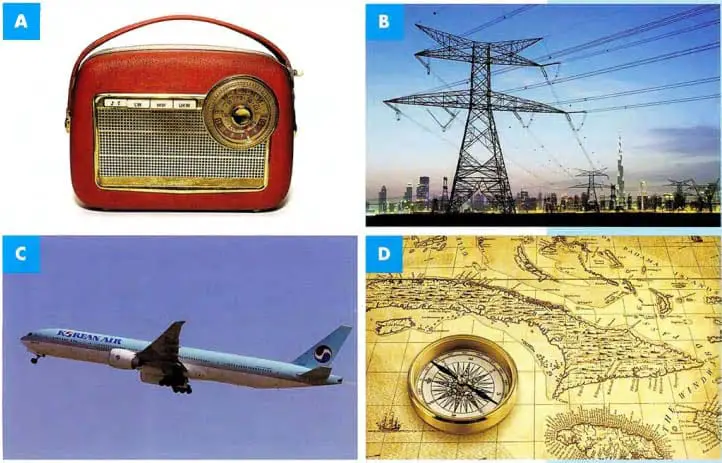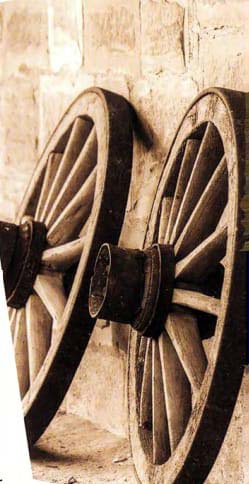06. Look at the pictures and discuss the questions with a partner.
A. B. C. D.
|
 |
|
1. Which scientific discovery or invention do the pictures represent?
2. For this Part 2 question, which of the above inventions do you think you would be best able to talk about for two minutes?
Describe an important scientific discovery or invention.
3. Can you think of any other scientific discoveries or inventions that you would feel more confident in talking about for two minutes?
|
07. Here is the full Part 2 question. Choose one of the discoveries or inventions you discussed in exercise 6 and, in one minute, write brief notes for a two-minute long turn. You will come back to these shortly.
|
|
Describe an important scientific discovery or invention that you think is very important.
You should say:
- how you learnt about it
- what it does
- what it is most used for today
and explain why you think it is such an important discovery or invention.
|
|
When you learn common verbs, especially those which introduce other verbs, it is important to understand and practise how they can be used in sentences or you may lose GRA marks. Questions you can ask yourself include:
- What form does the verb following this verb take?
- Can it be used to introduce a 'that' clause?
- Does it need an object?
|
08. Read the transcript of a candidate's answer to the Part 2 question in exercise 7. With a partner, decide if the verb patterns in 1-14 are correct. If they are incorrect, what should they be?
|

I'd like telling you what I know about one of the most significant inventions in human history: the wheel. Why is it so significant? Well, let me to begin by saying first of all, it basically enabled us to develop whole civilisations, as we could for the first time start transporting goods from place to place, and this mobility really made trade grow at an incredible speed. I remember to be taught about this at school. Our teacher told us not to see the wheel itself as the crucial invention, because it was actually the moment someone managed attaching a non-moving platform to two wheels that was critical. But I can't help think that you don't have to agree with everything you are told at school, and I would politely refuse to agree with him, if I was told this today. You see, without a wheel, a platform is just a bit of wood, essentially.
Anyway, wheels in everyday use. Well, can you imagine to live without them? It's practically impossible. You wouldn't be able to drive anywhere, for one thing. What's more, wheels allow us have a public transport system, and if wheels didn't exist, aeroplanes wouldn't be able to take off and land, and no one would be able to go on holiday.
How exactly a wheel works, I won't even attempt to explain, other than the fact they go round. It's something to do with force. I've never been any good at Physics, but maybe I should remember looking it up on the internet when I get home. But, overall, there's no question about how important the wheel is, and it will continue be an integral part of our lives forever.
Listen to the recording and check your answers.
|
09. Classify the verbs/ verb phrases according to the structures they use. Some can appear in more than one column.
|
would like
let
tell
imagine
can’t help |
enable
help
attempt
continue |
remember
refuse
allow
manage |
would like,
would like,
|
10. Look at the verbs that appear twice. Does the form of the verb phrase affect the meaning?
|
Suggested answerwould like
would like+ to infinitive expresses a personal plan, hope, expectation, etc., e.g. I would like to tell you about ...
would like+ object+ to infinitive expresses a plan, hope expectation, etc. of someone or something else, e.g. I would like you to tell me about ...
continue
There is no difference in meaning between continue+ infinitive and continue+ gerund, e.g. They will continue beingIto be an integral part of our fives forever.
remember
remember+ gerund= the action expressed by the gerund happens first, e.g./ remember (second action, now) being taught (first action,
past) about this at school. Do you remember learning your first words in English?
remember+ to infinitive= the action expressed by the to infinitive
happens second, e.g. I should remember (first action) to look it up (second action) on the internet when I get home. Did you remember to finish your homework?
|
11. Use the notes you made in exercise 7 to write a full answer to the Part 2 question, paying particular attention to verb patterns. Then, in pairs, take turns to deliver your Part 2 answers to each other (without reading aloud from what you have written). When it is your turn to listen, check that your partner is using verb patterns correctly.
|

